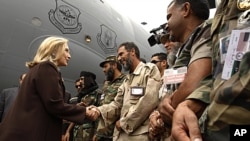U.S. Secretary of State Hillary Clinton went to Libya Tuesday to show support for the leaders Washington and other NATO countries helped bring to power. The visit highlights the struggle of Libya's interim government to prove it is strong enough on its own.
Hillary Clinton is the highest level U.S. official to go to Libya since the fall of Moammar Gadhafi and the rise of the National Transitional Council.
She met with NTC chairman Mustafa Abdel Jalil and interim Prime Minister Mahmoud Jibril and offered a variety of assistance and support for a transition to democratic rule.
In a press conference with Jibril, Clinton said it was an honor to stand on the soil of a "free Libya" and a privilege to see a "new future for Libya being born."
America's top diplomat offered help for Libya to establish greater security. "I am pleased to announce that we are going to put even more money into helping Libya secure and destroy dangerous stockpiles of weapons. And the administration, working with Congress, is going to provide $40 million to support this effort. We will also work with Libya to destroy chemical weapons stock," said Clinton.
And she promised millions more dollars in aid for a nation trying to rebuild. The help ranges from military equipment to educational and economic programs, medical care for wounded fighters, and archeological help in preserving Libya's Greek and Roman-era ruins.
The United States was an early backer, along with France and Britain, of intervention on behalf of the anti-Gadhafi uprising earlier this year and helped persuade the United Nations to mandate a NATO-led air mission to protect civilians.
But such help could come at a cost. The NTC has yet to consolidate either military or political rule.
Libya scholar Ziad Akl of the Ahram Center in Cairo says the various parties contending for power could accuse the NTC of over-reliance on the West.
"There seems to be an agreement on the necessity of the role of the West," said Akl. "It's just the amount of obedience that they have to show and the amount of autonomy that the West should provide. And [it] should not condition its aid to following a specific agenda laid down by the Western allies."
The U.S. and European nations are not the only ones trying to build a partnership with the new leaders of the oil-rich nation. Qatar moved quickly to side with the NTC, supporting the military mission and providing massive amounts of financial aid. Turkey was slower to take sides, but has made up time with both economic and political support. Yet the Ahram Center's Akl believes, however problematic, Libya's new leadership will show allegiance to the West.
"There is political capital that the West had laid down there, that even the Qataris and Turks cannot ignore or step over," said the scholar.
Clinton's visit comes a day after the NTC declared near-victory over Gadhafi loyalists in the desert town of Bani Walid. NTC fighters have yet to control the coastal city of Sirte and several southern areas. The continued fighting has shown the limits of NATO's help in what is now more a guerrilla-style conflict.
Clinton and Libyan leaders discussed bringing the numerous anti-Gadhafi militias carrying out those operations under unified, national control.
U.S. officials say she also pushed for a pledge that the new government abide by the rule of law, in particular concerning prisoners' rights. Human rights observers have criticized the NTC for not controlling the abuse of people in their custody.
Clinton in Libya Vows Support For Democracy




